Argus Press was the publishing arm of British Electric Traction. A splendidly named company founded in the late 19th century. They became a massive conglomerate through a series of unlikely mergers and acquisitions and expanded out from operating electric trams to owing a massive leisure portfolio. BET was involved in the early days of commercial television via an interest in Rediffusion, the company which helped found the London franchise Associated-Rediffusion, which later became Thames Television. BET acquired Argus Press in 1966.
145 Charing Cross Road, London, WC2H
Argus Press had a magazine division called Argus Specialist Publications and by 1982 they were getting into computer magazines. PERSONAL COMPUTING TODAY Volume 1 Number 1 was published in August 1982 and Vol 1 Number 1 of ZX COMPUTING came out around the same time with the less specific date of Summer 1982. Which was first ? It looks like a draw but the second issue of ZX COMPUTING has a cover date of AUG/SEPT 1982 so, by a process of Sherlock Holmes style deduction, issue one must have been JUN/JUL 1982. Both magazines had an editorial address of 145 Charing Cross Road, and a distribution address of 12-18 Paul Street; via another wing of the company, Argus Press Sales and Distribution Ltd.
Argus also distributed a magazine called COMPUTING TODAY (confusing, don't get it mixed up with ZX COMPUTING or PERSONAL COMPUTING TODAY). COMPUTING TODAY began as a monthly 32 page supplement with ELECTRONICS TODAY INTERNATIONAL before becoming popular enough to be published as a magazine in its own right in March 1979. There's a lovely pair of websites which link to pretty much every issue of ETI and COMPUTING TODAY. Both magazines were distributed by Argus Press Sales & Distribution but published independently by Modmags. They shared a close business relationship with Argus Specialist Publications, as we'll see, and at some point in the early eighties they shifted to using the editorial address(s) of Argus Specialist Publications and were later absorbed into the Argus massiv (see, I said it was confusing).
In 1982 COMPUTING TODAY printed a listing for a game called The Valley. Listings, for those who don't know or have supressed the memory, were type-it-in-yourself programs whose primary goal was educational, to teach readers how to program (or, at least, learn how to debug all the speeling errors that crept in during the typesetting process). The Valley was an epic by 1982 standards. Spread across 18 pages of the April and May issues. December 1982 saw ZX COMPUTING advertise The Valley to buy on tape for the ZX Spectrum, with disc versions also available for the Apple, PET, and Sharp. The company offering the game for sale was called ASP Ltd. Not to overstate the blindingly obvious but ASP Ltd was Argus Specialist Publications, with the same address and everything. The next issue of ZX COMPUTING ran an advert for four more ASP programs.
 |
| ZX COMPUTING Feb/Mar 1983 page 114 |
 |
| HOME COMPUTING WEEKLY 8 March 1983 page 2 |
145 Charing Cross Road was a generic block of offices which had many occupants over the years. An entertaining morning searching the British Newspaper Archive revealed it housed Philip’s Lamps Ltd (1930, makers of the Philip’s all-electric radio), Colgate-Palmolive-Peet Ltd (1953), the Electrical Industries Association (1965), and the Central London Careers Office (1984). Best of all in the 1960s it was home to the National Dairy Centre where interested parties could organise visits to the Dairyland Theatre, seating 50, to watch cooking demonstrations and see dairy related films. You could also write to them to request details of the seven-day milk diet, and children could enter the 1964 Milk Day essay contest by writing on the subjects of “keeping fit on milk,” or “my milkman”; first prize, a summer sightseeing tour of Holland and the Dutch dairy industry [ That’s enough dairy –THE BRITISH EGG ALLIANCE]
 |
| September 2023 |
145 Charing Cross Road is gone. Poured away down the drain of history like milk after the Windscale fire. The site, in fact this whole end of Charing Cross Road was taken out by the construction of Crossrail (I'll be deep in the cold, cold ground before I call it the Elizabeth Line). It's archived on the 2008 Streetview.
 |
| SPECTRUM COMPUTING May/.June 1983 |
But wait. What is the Argus Press Software group? So far we've talked about Argus Specialist Publications and their label ASP. Well, ASP may have looked like it was drifting through 1983 but it was actually being pushed by unseen currents.
1 Golden Square, London, W1R
 |
| HOME COMPUTING WEEKLY 14 February 1984 page 55 |
"Argus Press Software (APS) is seeking to expand it's range of products into all areas of computer software, and we need talented programmers to help us. We already market the highly successful ASP range of adventure and strategy games and will be announcing new ranges in other fields in the near future."
The advert ended with an invitation to write to Ron Harris at the new 1 Golden Square address. What's lovely is that on this occasion I know exactly when APS/ASP moved from Charing Cross Road to Golden Square. It was between 16th-19th December 1983. In December 1984 Argus Specialist Publications began printing a new magazine called GAMES COMPUTING and they note you'll need to write to Charing Cross Road before 16th December and Golden Square after 19th. If only other software publishers could be so accurate and considerate to me.
The advert ended with an invitation to write to Ron Harris at the new 1 Golden Square address. What's lovely is that on this occasion I know exactly when APS/ASP moved from Charing Cross Road to Golden Square. It was between 16th-19th December 1983. In December 1984 Argus Specialist Publications began printing a new magazine called GAMES COMPUTING and they note you'll need to write to Charing Cross Road before 16th December and Golden Square after 19th. If only other software publishers could be so accurate and considerate to me.
After that, not a lot happened. Until it was unexpectedly announced that Argus had brought out Quicksilva. HOME COMPUTING WEEKLY (5 June 1984 page 6), as you might expect, had the story:
"After months of secret talks Quicksilva's bosses have sold their company in a seven-figure deal. Both Quicksilva and new owners Argus Press Group say that the software company will continue to act independently....
Rod Cousens, who stays as QS managing director, says the strength of the new owners will ensure the future growth of QS...
Founder Nick Lambert now has homes in Barbados and Guernsey and John Hollis, who joined him soon afterwards, lives in Guernsey. Between them they owned 80 per cent of the shares with the rest held by staff.
Mr Cousens said "It means they can now enjoy millionaire status".
Talks with Quicksilva began about eight months ago Since then there have been many more meetings, some lasting well into the night.
Just a handful of people were it on the secret negotiations, but recently rumours have been spreading around the industry."
ASP/APS/BET/QS. I hope you are keeping track of all these initials. POPULAR COMPUTING WEEKLY couldn't. They wrongly credited the sale to Argus Specialist Publications rather than Argus Press Software and had to run a correction the following week. Their report in the same week as the HCW (sorry, all these initials are catching) story filled in a few more details with a quote from Rod Cousens, apparently the sale: "followed an approach from the Chief Executive of the Argus Group, and they reached their conclusion on May 29 at 11.30pm". The story continued, explaining that : "Co-founders and principle shareholders Nick Lambert and John Hollis have now left the company... with ASP chief executive Jim Connell becoming chairman. Ron Harris and Mike Dougan of ASP become non-executive directors while Mike Eyles becomes creative design executive."
The sale was big news. Quicksilva, founded in 1979, were still one of the big beasts of the industry alongside companies like Silversoft, Bug-Byte, and Artic, although they had started to lose ground to newer upstarts like Imagine. The sale was seen as part of a wider trend. An editorial in the 14-20 June issue of PCW described it as:
"the end of an era for the UK micro software industry... as the software market grew in size and importance, so the bigger, more established, companies started to move in. K-Tel, Virgin, Thorn EMI, Mirrorsoft and most recently, British Telecom, have all made forays into the software market."
It took the monthly magazines until around August to carry the news and by then the story was drowned out by an even bigger state-of-the-industry-event the spectacular bankruptcy of Imagine. CRASH noted: "the take over, which, according to Rod Cousens, had been on and off and on again for months... indicates something Rod Cousens has been heard to state would happen, a slow merging of interests between the several bigger games software houses to create a much more powerful base for marketing"
The most interesting report came in YOUR SPECTRUM (August 1984 page 5) who cast a very jaded eye over the story:
"Rumour has it that the deal was clinched for a sum in the range of £ 1.8-11 millions; our own sources tell us the figure was around £2.2 millions -but what's a few zeroes between friends?
And talking of friends, what exactly will OS's relationship with the Argus empire be like in the future. Asked for his comments, Ron Harris, managing director of Argus Press Software, explained that Quicksilva would become part of his organisation, and would continue to operate much as normal. He attempted to allay fears of incestuous business practice by claiming, "We are committed to an expansion programme, and it's too late for us to develop our own arcade range quickly -this seemed the logical thing to do." Would there really be no conflict of interest? "No" , he said, "there'll be none! No one from Quicksilva will l be working at this office - and Argus Press Software is totally separate to Argus Specialist Publications." Hmm, there's at least a floor between them — and some may also wonder why Ron Harris appears on the masthead of ZX Computing (another Argus publication) as the managing editor."
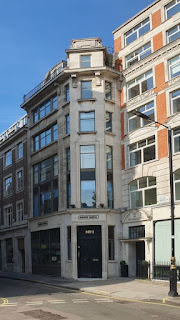 |
| September 2023 |
BET was a company which grew by acquisition, so it made sense for APS to do the same. I can understand APS watching rivals like Mirror Group Newspapers moving in on the software industry and deciding they needed to do the same. Ron Harris' comment that APS were "committed to an expansion programme, and it's too late for us to develop our own arcade range quickly" makes sense. What I can't work out is, why Quicksilva? It seems unlikely that chief executive Jim Connell opened his big software house directory and worked through the alphabet to Q before getting a positive response to his question, "hello, would you like to be taken over?" There must have been some existing business relationship between APS and QS but it remains obscure. All I can provide as faint evidence for my theory is to note that issue one of SPECTRUM COMPUTING featured a demo of Qucksilva's programme Speakeasy and a nice big advert on the back.
Despite the cynical opinion of YOUR SPECTRUM, Quicksilva really did remain independent of Argus. Once the flurry of news stories subsided you'd never know they had been taken over. They kept their Southampton address. You can scour the small print of their adverts and packaging and not see a mention of Argus Press Software. They genuinely do appear to have operated as a completely independent part of the group; until they weren't (more later).
Another acquisition followed in autumn 1984, Liverpool-based company Starcade. According to POPULAR COMPUTING WEEKLY (4-10 October 1984 page 5) the company was "a father and son team who wanted to concentrate on programming, rather than administration, so the sale to Argus was advantageous for them." Starcade seem best known for a well received Acorn Atom/BBC Micro game called Savage Pond.
Autumn 1984 also saw the release of a new Argus Specialist Publications magazine, YOUR COMMODORE. Issue one had a cover date of October 1984.
Argus Press Software launched a range of educational software called Clever Cloggs. Then a few more games drifted out on the ASP label. Including Invasion and Bismark (with a copyright date of 1983 but not reviewed until the second half of 1984) which were given a pair of stinking reviews by Angus Ryall, who reviewed strategy games for CRASH (October 1984 page 76). He described the games as "Dodos", "don't even waste your tape on copying them." Bismark, "comes, incidentally, from Argus Press, who publish all sorts of really naff computer magazines; but even they should know better than this." while Invasion was: "Another one from Argus. This one raised my hackles before it even started - 'You are the commander of the Western Alliance' it says, 'the Reds are attacking'. Then it says 'Reds are stupid' - 1 think this kind of thing is insulting the intelligence of the audience." The last few ASP releases have a sense of contractual obligation about them because Argus' mind was clearly elsewhere.
Quicksilva and Starcade were for arcade focused thrills so ASP was relaunched as Mind Games, to offer more thoughtful titles. The two standouts from the first batch are American Football, incredibly trendy in 1984, and Alien. Unless anyone knows differently, Alien was one of the first UK games based on an official film licence. It joined The Evil Dead, from Palace Software, and Ghostbusters, Activision, on shop shelves in late 1984. Alien got a glowing review from CRASH (April 1985 page 124 -the review was late) "Alien is published under the 'Mind Games' heading, part of the Argus empire. For once, I can actually find it in me to say some nice things about one of their products. Alien is a very good game indeed, and a very faithful reproduction of the film to boot." COMPUTER & VIDEOGAMES was less kind ending their February 1985 review:
"Argus Press Software say that in order to succeed with this program, you have to understand people and predict how they will behave. This appears to be a gross exaggeration as the only thing you have to predict is how the joystick is going to react. The game has less to do with people than anything I can possibly imagine and I wouldn't shell out 30p on a game of this son, let alone the asking price, which is phenomenal) for what you actually get.
Programmer Paul Clansey may have had good intentions but he certainly doesn't do justice to the film, with the game's Alien behaving more like Tinkerbell in Peter Pan than a monster that gets inside one's digestive system and fights its way out when it feels like it."
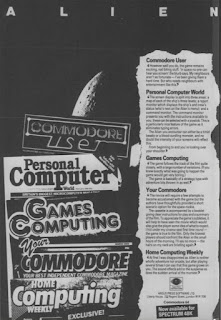 |
| C&VG March 1985 page 78 |
It looks like the disagreement let to Argus pulling its adverts from C&VG for at least a month. Alien and Give My Regards To Broad Street are both advertised in the February 1985 issue, the black and white Alien advert appears alone in March 1985, no Argus games are advertised in April, and then Give My Regards To Broad Street resumes advertising in May. The April 1985 issue of C&VG prominently prints Paul Clansey's furious rebuttal to the Alien review on the letters page. These are some of the highlights, it's worth reading the whole thing:
The attention of your readers will no doubt have been drawn to the outstandingly uncomplimentary review of Alien for the CBM64, in the February edition of C&VG. As designer and programmer of that game, I would like to make a few points concerning the review:
That the review is grossly misleading, containing many false statements. That C&VG should make it their responsibility to ensure that any reviews they print are a fair comment on the product concerned, and are not a reflection of the reviewer's lack of interest in, or comprehension of, the product...
His most common — and most offensive — criticisms concerned the behaviour of the Alien. That's not the Alien he's describing, though — he has in fact been locked in mortal struggle with his own movement cursor!
I can hardly believe that anyone could fail so totally to comprehend the game — even if a person is foolish enough not to read the instructions first...
I do not think that C&VG could have been entirely unaware of the malicious unfairness of the Alien review when they chose to print it — they certainly shouldn't be unaware any longer — so, while the damage to Alien has already been done. I ask you to make some amends by publicly acknowledging that the review was grossly unjust.
Liberty House 222 Regent Street, London, W1R
The contacts Argus Press Software made at 20th Century Fox while negotiating the Alien licence allowed them to get the rights to release the game of Paul McCartney's Give My Regards to Broad Street. Reviewers at the time were nonplussed but generally gave positive reviews and admired the ambition of squeezing in a fair chunk of the London map. Outside of The Beatles Rockband this is the only game which allows you to be Paul McCartney and the addition of Linda, Ringo, and George Martin turns it into a Take It Away reunion.
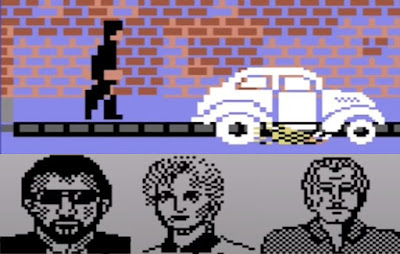 |
| Paul (top) plus Ringo, Linda, and George Martin |
March 1985 saw Argus complete a deal with wargaming company MC Lothlorien. Argus would handle "production and marketing of it's future titles," according to HOME COMPUTING WEEKLY (12 March 1985 page 5) while SINCLAIR USER seemed to think the deal only applied to "selected strategy games." Regardless, over in CRASH Angus Ryall was delighted by the first release.
"The Bulge... is the first release featuring Lothlorien in the role of design house only. The difference is incredible! It looks as though, freed from the incessant hassle of overdue bills, VAT returns, sales pitches to distributors, printing foul-ups and all the rest of it, Lothlorien have finally managed to concentrate their energies into the game....Lothlorien have come good at last."
Taking inspiration from the Argus/MC Lothlorien deal, Quicksilva negotiated a deal with Bug-Byte. CRASH noted that at the February 17th 1985 Leisure Electronics Trade show:
"Quicksilva themselves have tied up a similar deal with Bug- Byte through which they've gained the exclusive rights to seven titles developed by Bug -Byte -for a sum which the modest fellows at Quicksilva feel unable to disclose for some reason.
And Rod Cousens, Quicksilva's MD goes on record as saying that Quicksilva intends to see considerable expansion in the field of publishing third party software this year."
Argus Software Group moved from Golden Square to Regent Street some time around February 1985. How do I know this? Because when Argus made the special one-off Alien advert for C&VG the designer diligently included the new company address. The standard colour Alien adverts which ran all the way from November 1984 to May 1985 always carried the Golden Square address; I guess no one wanted to spend money on redoing them. Anyway Argus Specialist Publications remained at Golden Square so they could forward on any post. It looks like someone decided the ethical walls which separated ASP and ASG at Golden Square needed to be reinforced with actual physical walls.
 |
| September 2023 |
As you'd expect from the Regent Street address, Liberty House was probably the grandest of all the Argus addresses. It gets its name from the luxury department store Liberty which is right next door. Taking a picture proved trickier than expected. The building was too big to photograph from the pavement. If I stood on the far side of Regent Street my view was blocked by buses and taxis. If I stood in the middle of the road bus and taxi drivers would call me names. I took this picture from a the safety of a traffic island. Hello if you're one of the people in the photograph. These days Liberty House is home to a shop called COS. Some sort of upscale lettuce?
Argus Software Group seem to have taken this as an opportunity to bring all their different companies under one roof. Quicksilva were asked to move from Southampton to London. Quicksilva didn't want to move. Quicksilva didn't have any choice. The date of the move? Appropriately it was 1st April 1985. POPULAR COMPUTING WEEKLY reported the news (28 March-3 April 1985 page 4):
 |
| BIG K March 1985 page 6 |
None of the eight staff at Quicksilva, including managing director Rod Cousens will be moving to London and most of the employees have already been made redundant. Rod said, "1 won't be going to London with the company, but at the same time, I certainly don't want to leave the software industry.
Argus maintains that the move will be more convenient for Quicksilva with tape manufacturers and distributors nearer to hand."
Regardless of what Argus said. It's hard not to see this as an attempt to reign in the independence of their Southampton subsidiary who might have been getting a little too independent.
The Bug-Byte deal had raised a few eyebrows. In May 1985 C&VG gossiped:
"I now hear [Bug-Byte] have signed a deal with Quicksilva involving seven new games, This deal gives Quicksilva the rights to the seven new titles and is said to allow Bug Byte to concentrate on producing games. On the other hand, it could be that Bug Byte has cash flow problems and was bailed out by its old friend Rod Cousens at Quicksilva..."
Quicksilva also showed little corporate loyalty during the spat with C&VG. They carried on advertising with the magazine throughout. Lastly, and more tenuously. There's Quicksilva's game Blood 'N' Guts. Advertised and previewed as one of their Christmas 1984 release but held over until spring 1985 when it's become the beneficiary of Argus' 20th Century Fox contacts and become the official game of the film Fantastic Voyage. The game was ready, packaging was made under the Blood 'N' Guts name, and advertising booked until March 1985. Given the inevitable additional expense incurred by the delay and rebrand, was Quicksilva resistant to this marketing interference from the big boss. Especially as Blood 'N' Guts is clearly a better name.
In September 1985 Rod Cousens spoke to CRASH and gave his side of the story.
"Sadly much of the pioneering firm's identity was submerged when Quicksilva was bought by Argus, part of the massive BET group, last year. Cousens explained that the Argus deal came when the original founders of Quicksilva decided they'd had enough: 'the nature of the industry was stifling their creativity -they wanted a complete break'. After a spell in the West indies, Lambert and Hollis now live in the Channel Islands.
Rod Cousens left Quicksilva a while later when Argus decided to move the firm to their London offices from Southampton, He attributes the lacklustre performance of the firm since the takeover to the trauma of eight months of negotiation. In view of the crisis that has overtaken the micro industry over the past year, we asked if he had sold out at the right moment: 'it may be viewed like that in some quarters -but I don't necessarily subscribe to that view', came the reply."
After all this Bug-Byte ended up as part of Argus anyway. The company went into receivership in April 1985 and in September 1985 it was added to the Argus portfolio, used as a budget label selling games at £2.50. The same issue of HOME COMPUTING WEEKLY which covered the Bug-Byte story also reported that Argus Specialist Publications had brought YOUR 64 magazine from publishers Sportscene and planned to incorporate the most popular features into YOUR COMMODORE. Then in 1986 CRASH (May 1986 page 57) saw Lloyd Mangram note that Argus had taken on responsibility for marketing A 'N' F games but the news was out of date before it was even printed. A 'N' F went into receivership and, as with Bug-Byte, Argus purchased the name to use as another label. The former company A 'N' F mutated into a studio called Icon Design and worked on Wibstars for Argus, which was released on their A 'N' F label.
Victory House, Leicester Place, WC2H
 |
| September 2023 |
Fortunately for me, I'd snapped an earlier picture in an attempt to take in the atmos of Leicester Square. I'd rejected it on the grounds that the building I (thought) I was interested in was too off centre. So, there you go. Victory House and the fake Victory House which caused me so many problems all in one photo.
Also causing me confusion. Grand Slam. Argus becomes Grandslam Entertainment in 1987 following a management buy-out. What I didn't realise was Argus also used Grand Slam as a label name before the buyout. Although, I think, the only Gran Slam game was the terrible goalkeeping simulation Peter Shilton's Handball Maradona. For me, Grange Hill was the most notable Argus Game of this period (and it is an Argus Press Software game because the Mind Games label was quietly dropped somewhere around the end of 1986). If you'd like more information I recommend RoseTintedSpectrum's video about the game.
When Grange Hill the game was released at the start of 1987 the television series was broadcasting series 10. The previous year had been the acclaimed story of Zammo's heroin addiction, Season 10 was the difficult follow up. The harrowing story of Gonch and Hollo and Harriet the donkey. Gonch and Hollo were also the stars of the Grange Hill game. It isn't great. The most obvious omission is the theme tune, Chicken Man, probably omitted because I don't think the game is a licenced from the television series. It's based on the Methuen book Grange Hill After Hours. The copyright on the packaging is very carefully credited to Phil Redmond Enterprises Ltd rather than the BBC. The game is notable for its baffling amount of child death; you can end the game by tripping over a paving stone, jumping on a bollard, falling down a gap in a wall, being bitten by a dog, being bitten by some false teeth, and, appropriately given the message of the previous series, buying some drugs from a pusher; which results in this oddly haunting text.
Big conglomerates like BET were out of fashion in the late eighties and the company streamlined in order to focus on what it considered to be its core business. In 1985 the company sold its interest in Thames Television and it's controlling interest in Wembly Stadium. Then it began a series of management buyouts which would ultimately include Argus Specialist Publications and Argus Consumer Publications. A management buyout of Argus Press Software was inevitable and towards the end of 1987 managing director Stephen Hall brought the company which moved on to the second phase of its existence as Grandslam Entertainment. (To be, as they say, continued...)
For the next couple of months I'm dialling back the software house blogs to one a month. There's nothing terrible happening but I've suddenly got a ludicrous amount of things taking place at the same time including a forthcoming road trip which is frighteningly ambitious but should help generate enough content to get me well into 2024. However, I like the biweekly pattern of updates so I'm going to try and publisher shorter (ha!) articles in between. Leave a comment, or email whereweretheynow@gmail.com and follow me on Twitter @shammountebank. In the meantime, I'm going to breathe into a paper bag while I fret about parking in Ludlow (ohwhatagiveaway).
_01.png)


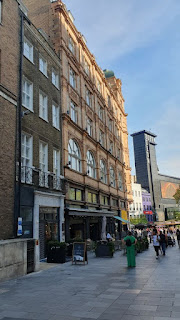
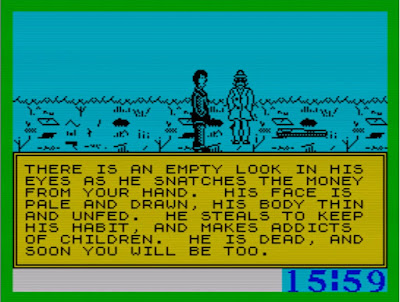






No comments:
Post a Comment